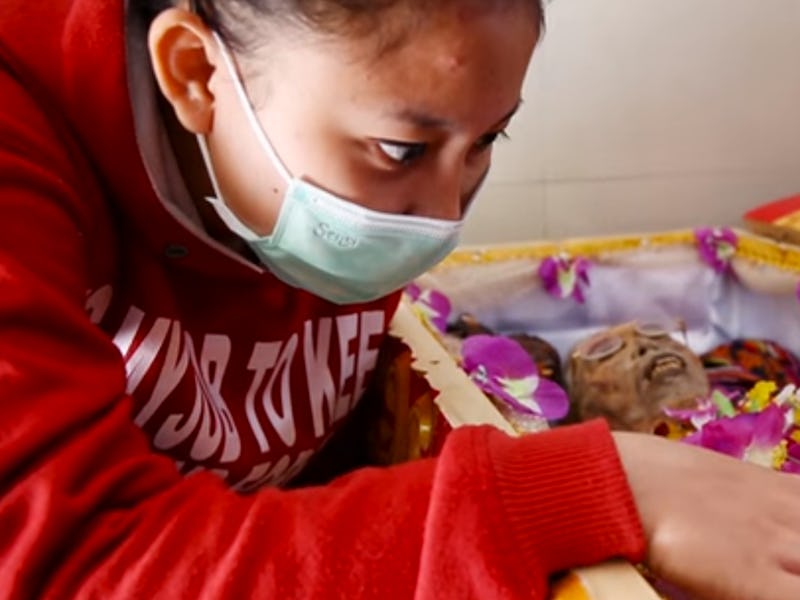This Community in Sulawesi, Indonesia Keeps the Dead in Homes for Years
It may be unsettling to some western cultures, but keeping the body of the deceased is a way to honor the dead.

Cultures and societies respect the dead differently all around the world. Every year on my father’s side of the family, all my relatives gather at the cemetery where my ancestors are buried to take part in the Chinese ritual called Qingming, or Cleaning of the Grave. We lay out a full meal of chicken, duck, and rice, pour beer and tea, light candles, and even burn paper money so our deceased loved ones are comfortable in the afterlife. For the people living in the region of South Sulawesi, one of Indonesia’s 17,508 islands just east of Borneo, death is a long and sacred process — one where death does not come until the body leaves the home.
The Toraja of Sulawesi keep the bodies of the deceased in their homes for as long as a few years, believing “that a dead person who is still at home is not dead.” National Geographic documented the culture’s sacred tradition in a video, revealing their lavish celebrations for the dead. When a loved one passes away, the family members treat the body as if the person were still alive. They describe death as prolonged sleep. Torajans take the utmost care of the body, cleaning it and brushing off dirt, changing its clothes, praying with it, feeding it, and leaving the lights on in the evening.
“We are not afraid of the dead body because our love for our ancestors is much greater than our fear,” a relative of one of the deceased says.
Researchers didn’t know when these death practices began until carbon dating of wooden coffin fragments revealed that it dates back at least as far as the ninth century A.D., according to an accompanying article in National Geographic.
Yacob Kakke, an expert of the Torajan culture, explains that lower class citizens tend to the bodies for only a few weeks, while the middle class keep them for several months, and the upper class for a few years. Besides wanting to keep their loved ones near, they also want to push off funerals so as many relatives as possible can attend.
A Torajan funeral, usually held in August, is a massive celebration. There’s music, a feast of pork, vegetable, and rice for hundreds of gathered family and friends, and an ornate wooden bier called duba duba to transport the body. In Sulawesi, buffalo are sacred creatures used for currency and vehicles in the afterlife. The higher number and best quality buffalo a family can acquire for a funeral the better. National Geographic describes these funerals as great fun:
“A funeral is a wedding, a bar mitzvah, and a family reunion all in one, easily outstripping the conviviality of Irish wakes. Lavish funerals are a chance to meet and mingle, to eat and drink well, to enjoy games and entertainment—even to network for jobs or eye prospective mates.”
Like many cultural customs, paying respect to ancestors doesn’t end at the burial for Torajans. Families hold second funerals called ma’nene’ every few years where they clean the tombs, change the deceased’s outfit with fresh clothes, and provide snacks and cigarettes.
There are nearly half a million Torajans that live in the highlands of Sulawesi. About 90 percent practice Christianity, as recitations from the Bible are read throughout the ceremonial process, but they also remain true to their traditional religion Aluk to Dolo or Way of the Ancestors.
While some in the western world may find this Torajan tradition as strange or even morbid, it’s a core piece of the culture’s heritage and an important part of celebrating both life and death.
“So maybe for the world this is something unusual,” Pieter Sambara said, a relative of the deceased. “However, this is our culture. This is our uniqueness.”